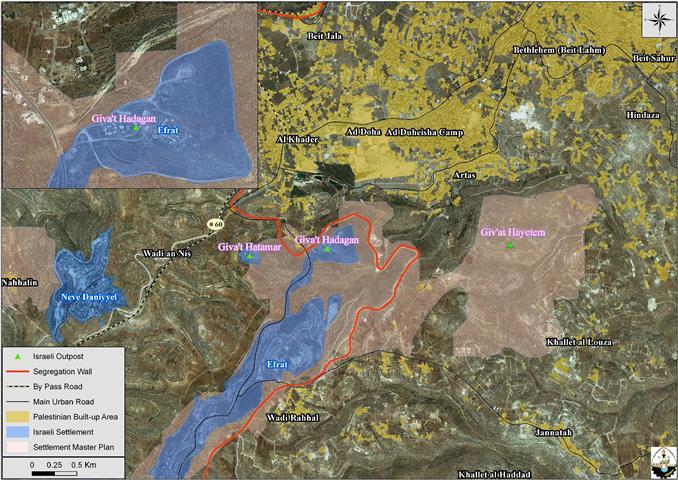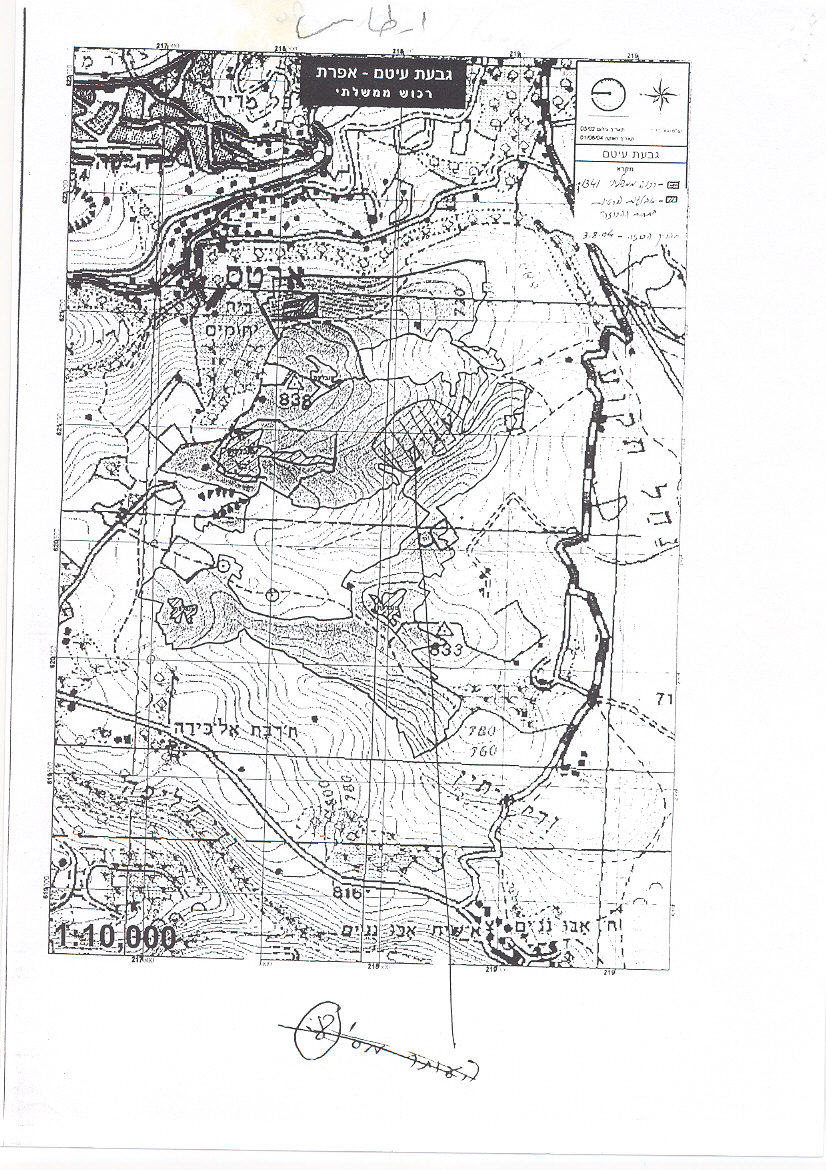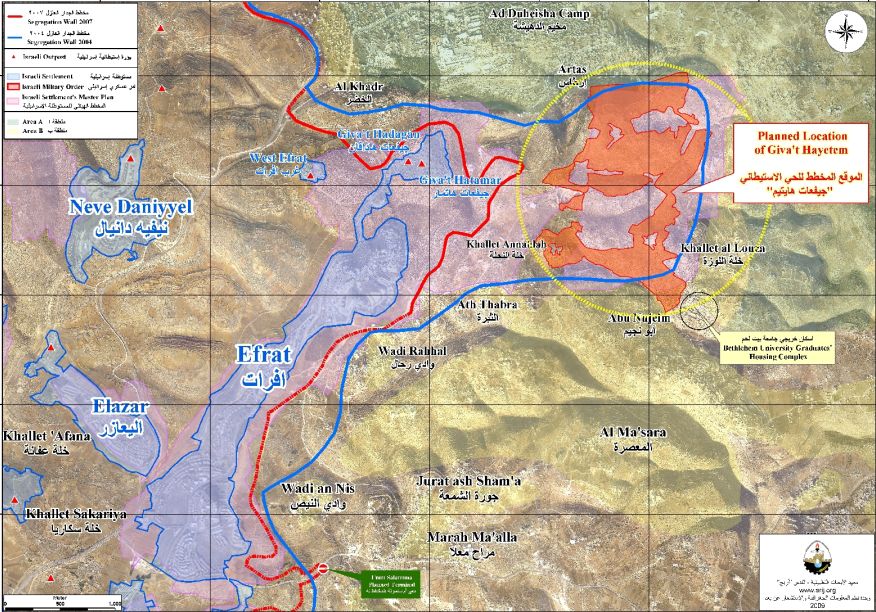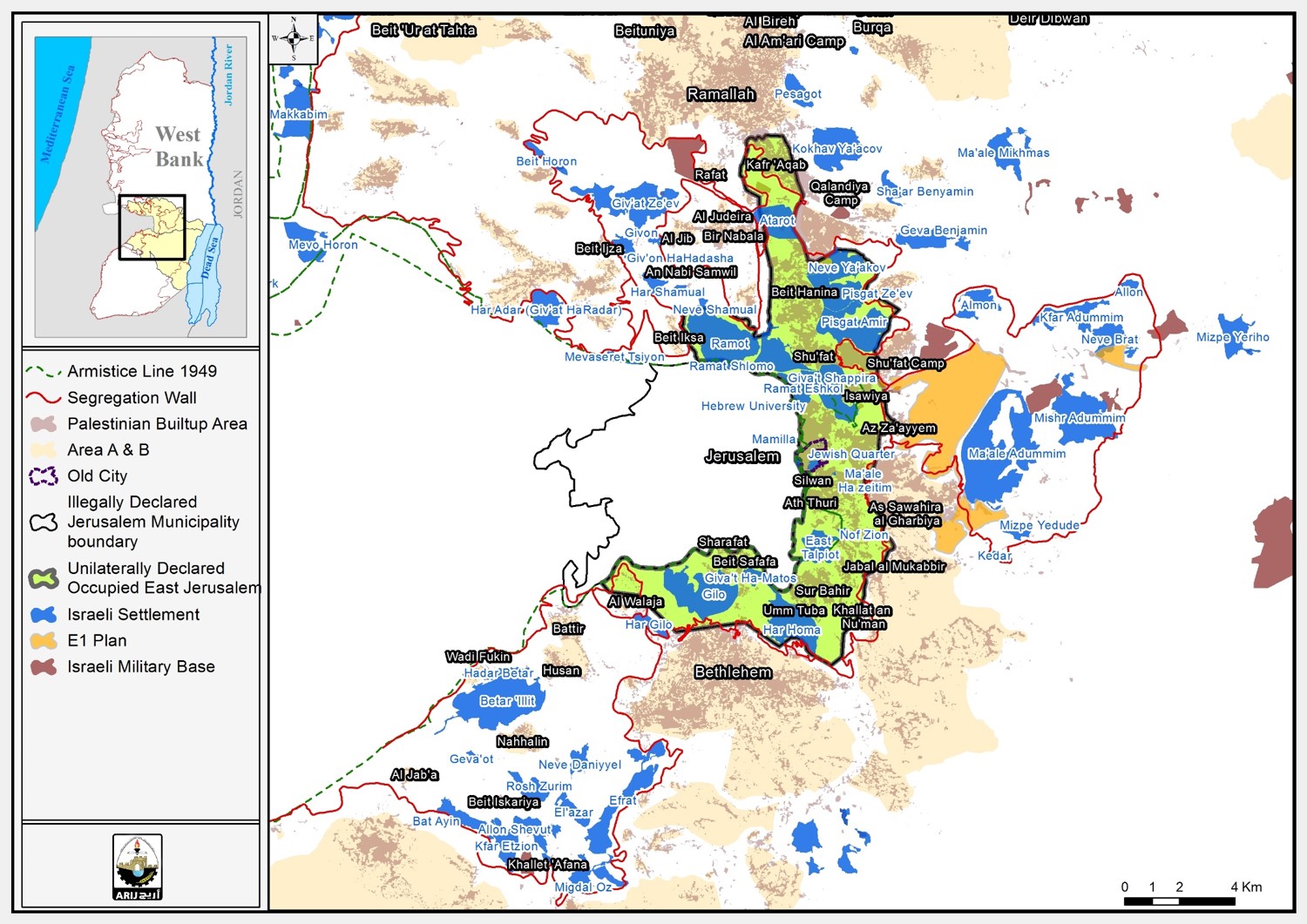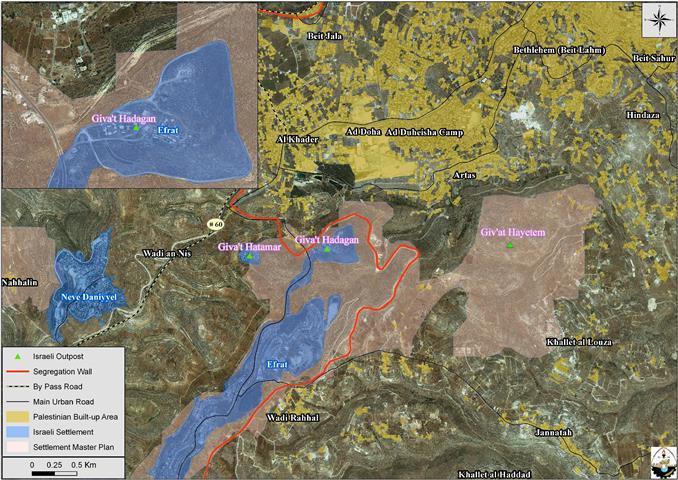On September 7, 2014, the so-called Israeli “High Court of Justice” rejected the final petition submitted by Palestinian owners of 1700 dunums of land southwest of Bethlehem Governorate paving the way to finalize the confiscation of the land which is located north of the illegal settlement of Efrat .
The story dates back to the year 2004, the “ Israeli Custodian of absentee Properties” issued the military order. (No. 59) (5727-1967) declaring 1700 dunums in the area of Khallet An-Nahla and Shu'ab Salman north of the settlement of Efrat as "State Land" where owners were denied entry to the land and were prevented from using the land for any purpose or under any circumstances. See Photo 1 & Photo 2
Photo 1 & Photo 2: A copy of the Military Order
Map 1: The targeted lands in Bethlehem Governorate
Later on, Palestinian owners of the targeted lands submitted nine petitions against the confiscation order to the Israeli Supreme court which rejected eight of these petitions by October 2011, while the last petition was rejected on September 2014 which will lead to a de facto seizing of the land. To read more about the aforementioned confiscation order refer to the previously written case study “Israeli settlers are on the move to a establish a new settlement outpost in Bethlehem Governorate. "Giv'at Ha’eytam hill will rise up on lands of Artas".October 20,2011.
Expropriation for Colonial Purposes
As a matter of fact, the targeted land located in the far north of Efrat settlement where a new settlement neighborhood of Giv’at Hadagan started to take place in the site.
Giv’at Hayetem is an illegal settlement outpost established in the year 1995 inhabited by dozens of Israeli religious settlers. It is located in the far north of the illegal settlement of Efrat. Later on and on December 2011, the Israeli Ministry of Housing and Construction issued tenders for the construction of 40 housing units in Giv’at Hayetem instead of the 40 illegal caravans that was installed in the site in the year 2000, where as mentioned before the construction of the 40 housing units is a part of a larger plan to build more than 500 housing units n the new neighborhood which is awaiting of the final approval of the Defense Minister before issuing tenders for marketing and construction.
Currently, the construction of the aforementioned 40 housing units had been finished while the Israeli authorities are preparing to the construction of the remaining 460 housing units in the site. See the map below:
Map 2: location of Giv’at Hayetem outpost
The Inflated Settlement City of Efrat
The settlement of Efrat was established in 1979, on lands originally confiscated from the Palestinian villages of Artas and Al-Khader. Today the settlement occupies a total land area of 2180 dunums and houses 9239 Israeli settlers. Efrat settlement located some 6.6 km from the 1949 Armistice line (Green line) and 5.3 km south of the city of Bethlehem. Two main outposts were erected in the vicinity of Efrat settlement, they are: Giv'at Hatamar and Giv'at Hadagan. Another outpost which is in the move to be erected and gained the Israeli ministry of Defense approval is Giv'at Hayetem.
To Conclude
The Israeli construction and expansion of Illegal settlements and outposts contradicts with the International law rules and conventions:-
- Under the Universal Declaration of Human Rights adopted and proclaimed by General Assembly resolution 217 A (III) of, December 10, 1948, Article 17 reads: 'No one shall be arbitrarily deprived of his property.' Which means it bans Israel from destroying or confiscating the property of the Palestinians at any case.
- Moreover, articles 53 & 147 of the Fourth Geneva Convention of 1949 indicated that: Extensive destruction and appropriation of property not justified by military necessity and carried out unlawfully and wantonly. is a grave breach of the Convention.
- Also Art. 23 of the Hague Convention of 1907 also provides: In addition to the prohibitions provided by special Conventions, it is especially forbidden to destroy or seize the enemy's property, unless such destruction or seizure be imperatively demanded by the necessities of war.
- Article XXXI of the 1995 Oslo agreement Israelis forbidden from building or planning to any project or settlements or any colonial expansion or any plan that lead to change the status of the West Bank and Gaza Strip. The article provides “Neither side shall initiate or take any step that will change the status of the West Bank and the Gaza Strip pending the outcome of the permanent status negotiations”.
The existence of the Israeli settlements and outposts in the West Bank and their expansions are Illegal and contradicts with the international law rules, United Nations Security Council Resolutions such as 237 (1967), 271 (1969), 446 (1979), 452 (1979) ,465 (1980.
- Resolution 446 March 22, 1979 calls on Israel to rescind its previous measures and to desist from taking any action which would result in changing the legal status and geographical nature and materially affecting the demographic composition of the Arab territories occupied since 1967, including Jerusalem and, in particular, not to transfer parts of its own civilian population into the occupied Arab territories"
- Also the resolution 452 of the 1979 “calls upon the Government and people of Israel to cease, on an urgent basis, the establishment, construction and planning of settlements in the Arab territories occupied since 1967, including Jerusalem.”
- Furthermore the Forth Geneva Convention also states in Article 49 that “The occupying power shall not deport or transfer parts of its own population into the territories it occupies.” and Article 174 of the same convention “prohibits the 'extensive destruction and appropriation of property not justified by military necessity and carried out unlawfully and wantonly.”
- In May 2001, the head of the International Red Cross delegation to Israel and the Occupied Territories said that settlements are "equal in principle to war crimes". (Note: "The transfer, the installation of population of the occupying power into the occupied territories is considered as an illegal move and qualified as a 'grave breach.' It's a grave breach, formally speaking, but grave breaches are equal in principle to war crimes", Rene Kosirnik, head of the ICRC delegation to Israel and the OPT, press conference 17 May 2001).
Prepared by:
The Applied Research Institute – Jerusalem


